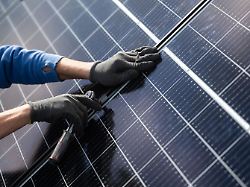The Chinese solar industry dominates the market unchallenged. This should change by producing a significant proportion of the technologies in Germany and Europe again. But without the Chinese, the ailing industry in Germany will not get back on its feet.
The German solar industry is fighting for survival. Low prices from Chinese suppliers are no longer just causing problems for the Swiss solar company Meyer Burger and Solarwatt. Meanwhile, a third major module producer is also questioning Germany as a location: the Chemnitz-based photovoltaic manufacturer Heckert Solar. All companies are united by the complaint: they cannot operate profitably under the current market conditions. Let alone keep up with Chinese dumping prices. If the federal government does not help the industry, they will want to move their production facilities abroad.
As a result of decades of government support, a rapid increase in domestic demand and intense local competition, China now dominates the solar industry: the country accounts for more than 80 percent of global production. Given the oversupply of Chinese imports, there are not only calls for greater variety, but also increasing safety concerns about the use of components made in China.
Federal Minister of Economics Robert Habeck never tires of emphasizing that he wants to support those remaining in the industry in Germany. The aim is to produce a significant part of the technologies in Germany and Europe. The question arises: Is rebuilding a domestic solar industry even realistic and what consequences would this step have?
“Chinese manufacturers now have a significant lead, especially when it comes to scaling production, which has also led to a significant cost advantage,” says DIW expert Peter-Wolf Schill ntv.de. In principle, he thinks it is possible that the European solar industry could catch up on this lead. “But that would require significant funding, the appropriate political will and a lot of political perseverance,” says Schill. Given the current financial situation, the DIW expert believes it is unlikely that the German solar industry will become competitive again.
“Everyone is bleeding at the moment”
In the Financial Times, the world’s largest solar panel manufacturer, Longi Green Energy Technology of China, warns that Europe and the United States would risk slower decarbonization of their economies if they ban Chinese companies from their renewable energy supply chains. Vice President Dennis She noted that restricted Chinese solar supplies would “at least slow” Western countries’ transition away from fossil fuels. He also warns that without Chinese involvement, the cost of solar panels would double in countries like the United States.
With regard to the consequences for decarbonization, DIW expert Schill She is right under one condition: “If a certain amount of ‘local content’ is fundamentally required, that could actually slow down the energy transition.” At the moment he does not see this danger in the resilience tenders being discussed. In order to help the industry in the short term, so-called resilience tenders and bonuses should be anchored in the Renewable Energy Sources Act. A higher feed-in tariff would then be paid for solar systems that are primarily produced in Europe.
According to energy consulting firm Wood Mackenzie, production costs for solar panels in China fell by more than 40 percent last year to about 15 cents per watt – compared to 30 cents in Europe and 40 cents in the United States. This decline is partly due to lower material costs and oversupply. “Everyone is bleeding at the moment,” the “FT” quoted She as saying. He added that only actors with sufficient size will survive. Small or new providers would disappear from the market.
According to Wood Mackenzie, China will continue to be a leader in solar technology after investing more than $130 billion last year alone. At least in the next three years, the country will control more than three quarters of the world’s production capacity for polysilicon, wafers, cells and modules.
Reconstruction is not possible without China
In the fight for competitiveness, the German solar industry in particular is facing a serious problem. According to Jochen Rentsch, solar expert at the Fraunhofer Institute for Solar Energy Systems, the reconstruction of the domestic industry is not possible without materials and preliminary products from China. “If, for example, you are looking for equipment for solar wafer production, you will currently not find a competitive non-Chinese manufacturer. If we want to implement the construction quickly, we would have to rely on China,” the Frankfurter Rundschau quoted Rentsch as saying .
According to the expert, by allowing member states to specifically promote companies involved in energy transition technologies, the EU has already created favorable conditions. After all, EU competition law actually prohibits this. “The member states can, for example, use money from the ‘Green Deal’ pot for this purpose. They can also try to create industrial clusters with the help of targeted location support,” says Rentsch.
So that European companies can assert themselves against cheap competition from China, subsidies from the federal government for the solar industry are also being discussed. Instead of subsidizing in Germany alone, according to the President of the Leibniz Institute for Economic Research in Halle, consideration should be given to how supply chains could be set up more broadly at a European level. A subsidy race within Europe must be avoided at all costs.
In any case, it is questionable whether subsidies would change anything at all in China’s supremacy. DIW expert Schill says: “It is controversial among economists whether funding for the European solar industry would make sense at all.” On the one hand, it is certainly helpful to be independent of a supplier country. On the other hand, the question is whether the German solar industry is so far behind that it is hardly possible to catch up. In view of the high capital and energy costs, for example, specialization in other economic sectors would probably make more sense in the long term, according to the DIW expert.
